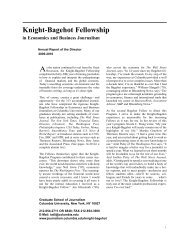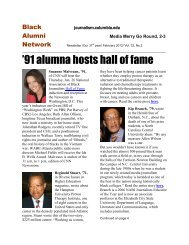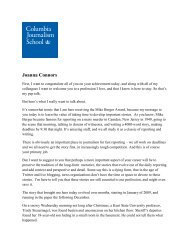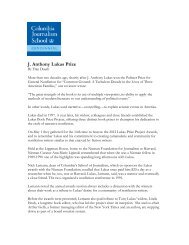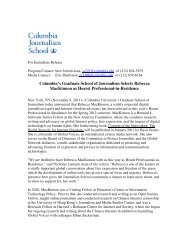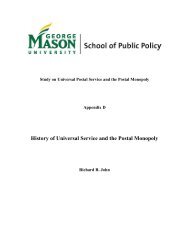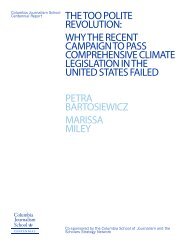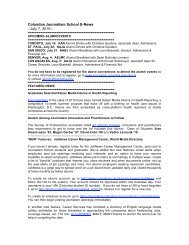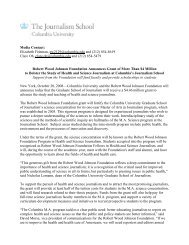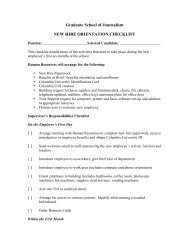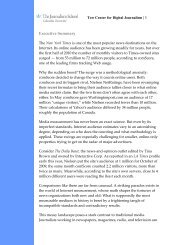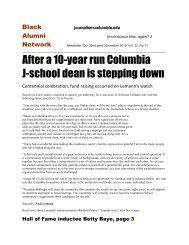Download PDF - Columbia University Graduate School of Journalism
Download PDF - Columbia University Graduate School of Journalism
Download PDF - Columbia University Graduate School of Journalism
You also want an ePaper? Increase the reach of your titles
YUMPU automatically turns print PDFs into web optimized ePapers that Google loves.
FOR IMMEDIATE RELEASE<br />
Media Contacts:<br />
Melanie A. Farmer, 212-854-9082 or mf2362@columbia.edu<br />
Elizabeth W. Fishman, 212-854-8619 or ew2129@columbia.edu<br />
<strong>Columbia</strong> <strong>University</strong>’s <strong>Graduate</strong> <strong>School</strong> <strong>of</strong> <strong>Journalism</strong> Opens<br />
New Center for Investigative <strong>Journalism</strong><br />
Seasoned investigative journalist Sheila S. Coronel will direct<br />
Toni Stabile Center for Investigative <strong>Journalism</strong><br />
<strong>of</strong> Sheila S. Coronel)<br />
New York, Sept. 20, 2006 – <strong>Columbia</strong> <strong>University</strong>’s <strong>Graduate</strong><br />
<strong>School</strong> <strong>of</strong> <strong>Journalism</strong> on Tuesday, Sept. 26 will host the opening<br />
ceremony <strong>of</strong> the newly established Toni Stabile Center for<br />
Investigative <strong>Journalism</strong>, dedicated to training students<br />
specializing in investigative journalism. David Remnick, editor <strong>of</strong><br />
The New Yorker, will introduce the center’s inaugural director and<br />
faculty chair, Sheila S. Coronel, an award-winning investigative<br />
journalist well known for her coverage <strong>of</strong> the Philippines<br />
government during times <strong>of</strong> corruption and upheaval. (Left: Photo<br />
The Toni Stabile Center for Investigative <strong>Journalism</strong> is endowed by a $5 million donation<br />
from Toni Stabile <strong>of</strong> Naples, Florida. Ms. Stabile is an investigative journalist and<br />
president <strong>of</strong> the Vincent A. Stabile Foundation. The Center, which opened its doors to<br />
students on Aug. 21, will train students specializing in investigative journalism as part <strong>of</strong><br />
the school’s master <strong>of</strong> science degree program. The center will also <strong>of</strong>fer fellowship<br />
opportunities.<br />
The ceremony will take place in the school’s lecture hall at 7:00 p.m. In addition to<br />
Coronel’s address on the state <strong>of</strong> global investigative journalism, Dean Nicholas Lemann<br />
is expected to announce an historic $100 million fund-raising campaign, which coincides<br />
with the school’s 100 th anniversary. Members <strong>of</strong> the press who wish to attend the event<br />
must call in advance, (212) 854-9082.
“The launch <strong>of</strong> the Stabile Center is another step forward,” said Dean Lemann. “The<br />
study <strong>of</strong> investigative journalism is central to the watchdog role <strong>of</strong> a free press. By<br />
strengthening our students’ investigative reporting skills, the new center will help<br />
strengthen the practice <strong>of</strong> journalism.”<br />
About Sheila S. Coronel<br />
Coronel most recently served as executive director <strong>of</strong> the Philippine Center for<br />
Investigative <strong>Journalism</strong> (PCIJ), an independent nonpr<strong>of</strong>it media agency she co-founded<br />
in 1989 to promote investigative reporting. Nothing like it had previously existed in the<br />
Philippines—a country known for keeping a tight leash on an extremely lively and active<br />
press.<br />
PCIJ was established to promote investigative reporting on current issues and matters <strong>of</strong><br />
large public interest, in the hope that by doing so, it would encourage more in-depth<br />
reporting and strengthen the Philippine media’s ability to act effectively. Under Coronel’s<br />
leadership, the PCIJ became the premier investigative reporting institution in the<br />
Philippines and Asia. In 2003, Coronel received the prestigious Ramon Magsaysay<br />
Award, <strong>of</strong>ten described as the Asian Nobel Prize, for “leading a groundbreaking<br />
collaborative effort to develop investigative journalism as a critical component <strong>of</strong><br />
democratic discourse in the Philippines.”<br />
“My experience as a journalist has shown that carefully researched, high-impact<br />
investigative reports help build the media’s credibility,” said Coronel. “The press as an<br />
institution is strengthened if journalists have demonstrated that they serve the public<br />
interest. Investigative journalism, however, requires an investment in time, resources for<br />
research, and the development <strong>of</strong> reportorial talent. Unfortunately, in many parts <strong>of</strong> the<br />
world, such investment is lacking. I look forward to sharing with my students the<br />
techniques and ethos <strong>of</strong> watchdog journalism in the hope that they will do great reporting<br />
in the investigative tradition.”<br />
Coronel’s career as a journalist spans more than two decades. She has reported for The<br />
Manila Times, The Manila Chronicle, and The New York Times, among others, and has<br />
covered some <strong>of</strong> the Philippines’ most renowned political figures, including Ferdinand<br />
Marcos, Benigno Aquino, Corazon Aquino, and Joseph Estrada. A recipient <strong>of</strong> numerous<br />
awards and recognitions, Coronel in 2001 was named the country’s Print Journalist <strong>of</strong> the<br />
Year. That same year, she was listed among Asiaweek’s Top 50 Communicators in Asia.<br />
About the <strong>Columbia</strong> <strong>University</strong> <strong>Graduate</strong> <strong>School</strong> <strong>of</strong> <strong>Journalism</strong><br />
For almost a century, the <strong>Columbia</strong> <strong>University</strong> <strong>Graduate</strong> <strong>School</strong> <strong>of</strong> <strong>Journalism</strong> has been<br />
preparing journalists in a program that stresses academic rigor, ethics, journalistic<br />
inquiry, and pr<strong>of</strong>essional practice. Founded with a gift by Joseph Pulitzer in 1903, the<br />
school <strong>of</strong>fers master <strong>of</strong> science, master <strong>of</strong> arts, and doctor <strong>of</strong> philosophy degrees.<br />
About <strong>Columbia</strong> <strong>University</strong><br />
Founded in 1754 as King’s College, <strong>Columbia</strong> <strong>University</strong> in the City <strong>of</strong> New York is the<br />
fifth oldest institution <strong>of</strong> higher learning in the United States and today is one <strong>of</strong> the
world’s leading academic and research institutions. For more information about<br />
<strong>Columbia</strong> <strong>University</strong>, visit www.columbia.edu.<br />
###



